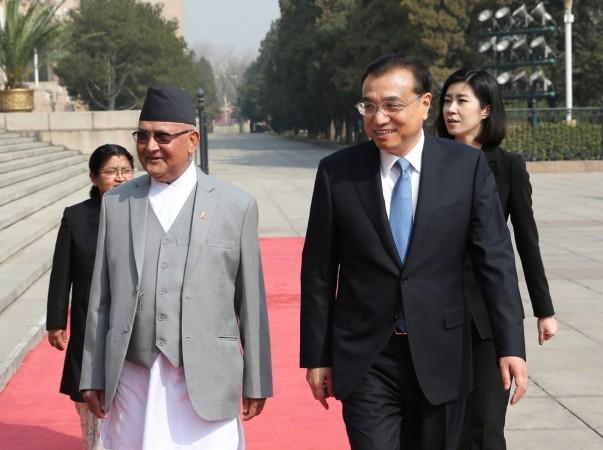
China and Nepal Monday reportedly signed 10 agreements, including a transit and transportation treaty, to help boost latter's connectivity, trade and tourism, a move that is likely to come as a setback for India that accounted for about 60% of the total imports in the landlocked Himalayan nation.
The agreements were signed in Beijing, during Nepali Prime Minister KP Sharma Oli's one-week trip to China, Xinhua news agency reported. After a meeting with Oli, Chinese Premier Li Keqiang said, "China looks forward to seeing a peaceful and prosperous Nepal."
Both China and Nepal will begin studies on a bilateral free-trade agreement (FTA) in order to fasten the launch of the negotiations, Li said, adding that his government would "encourage Chinese banks to set up branches in Nepal," Li added.
Oli ensured that no external factor would affect the relations between Nepal and China. Nepal will ensure it makes the best out of China's peaceful development and would participate in latter's "Belt and Road" initiative.
Nepal hopes its relationship with China would grow further to benefit it in terms of development in sectors, including infrastructure, energy, agriculture, finance, trans-border trade, tourism and education.
"The two prime ministers made a comprehensive review of bilateral relations and expressed satisfaction over steadily growing relations between the two countries. The two sides exchanged substantive views on further strengthening and consolidating mutual trust and understanding as well as promoting mutually beneficial cooperation in various fields," Nepal's foreign ministry said in a release.
Oli's visit and Nepal-China deal holds greater significance for India as its relationship with Kathmandu said to have turned bitter when Madhesis imposed a blockade on trade from India in protest against the Himalayan nation's new constitution for five months. The blockade had caused acute shortage of fuel, cooking gas, medicines and other supplies to Nepal.
The Nepal government had blamed India for the trade blockade, claiming New Delhi supported the Madhesis — a disadvantaged group in Nepal that is ethnically, linguistically and culturally linked to the people of Bihar and Uttar Pradesh in India. India had denied the allegations.
The Madhesi people called off the blockade last month.








